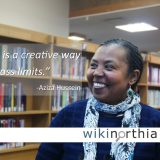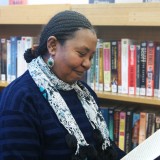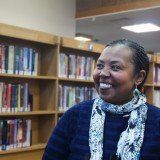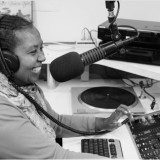A new life – Glenroy.
Aziza Hussein has been a regular visitor to Glenroy library since migrating to Australia in late 2014. The library was one of the first places she visited when she moved to Glenroy, “it’s the thing I need most” she says. Aziza presents a weekly radio show on 3CR Community Radio, and is developing her first television drama, so the library is the perfect place for writing and research, “what more could I want?”
Life in Sudan – finding a voice.
Aziza first worked as a veterinary doctor, but after ten years “that was enough!” and it was time for her to pursue her true passion for media. She went back to university to study a Bachelor of Mass Media, and then on to a Masters – focusing her research on community radio in Sudan. After a long stint studying, it was time to find work. It was in newspapers that Aziza established herself, as a columnist writing about social issues in a number of major metropolitan mastheads.
Life in Australia – pushing past limits.
It wasn’t long before Aziza got involved in radio in Melbourne. With her background in journalism and interest in community radio, it seemed natural to search for a media home and 3CR Community Radio was where she found it. The democratic and egalitarian nature of the station impressed her, and its openness to new volunteers quickly made her feel a part of the community – welcomed and “like an equal.”
Aziza joined the Monday Breakfast show, a fast-paced morning current affairs program, which was an experience that quickly immersed her in her new community. Just over a year later, Aziza graduated to having her very own program, the Nile Show. A weekly program in Arabic and English, the Nile Show provides a platform for Sudanese women in Australia. “The idea of the Nile Show started partially because I’m a journalist and I always try to listen out for the issues that are not spoken about, rather than the issues people are willing to be open about,” Aziza says. And those issues are different here in Australia to Sudan, so with “every show I learn much about my community.”
In Sudan censorship is strong and “you know the limits of when you need to stop criticising the government,” Aziza says. “At first in Australia, I thought there were no limits. But they are hidden [social] limits.” It is these limits – legal and social – and what goes un-said, that interests Aziza.
Aziza’s ear for a story, and her critical perspective on social issues has led her to explore the power of fiction, and that other mass broadcast medium – television. Collaborating with a director back in Sudan, Aziza’s tele-drama will seek to “shine a spotlight on social issues,” such as the pervasive nature of violence and its manifestation in domestic violence experienced by women. “When people are used to violence, they do not know that things can be different,” Aziza says, and so with drama she can not only talk about the issue, but help people imagine another reality. “Art is a creative way to pass limits.”




